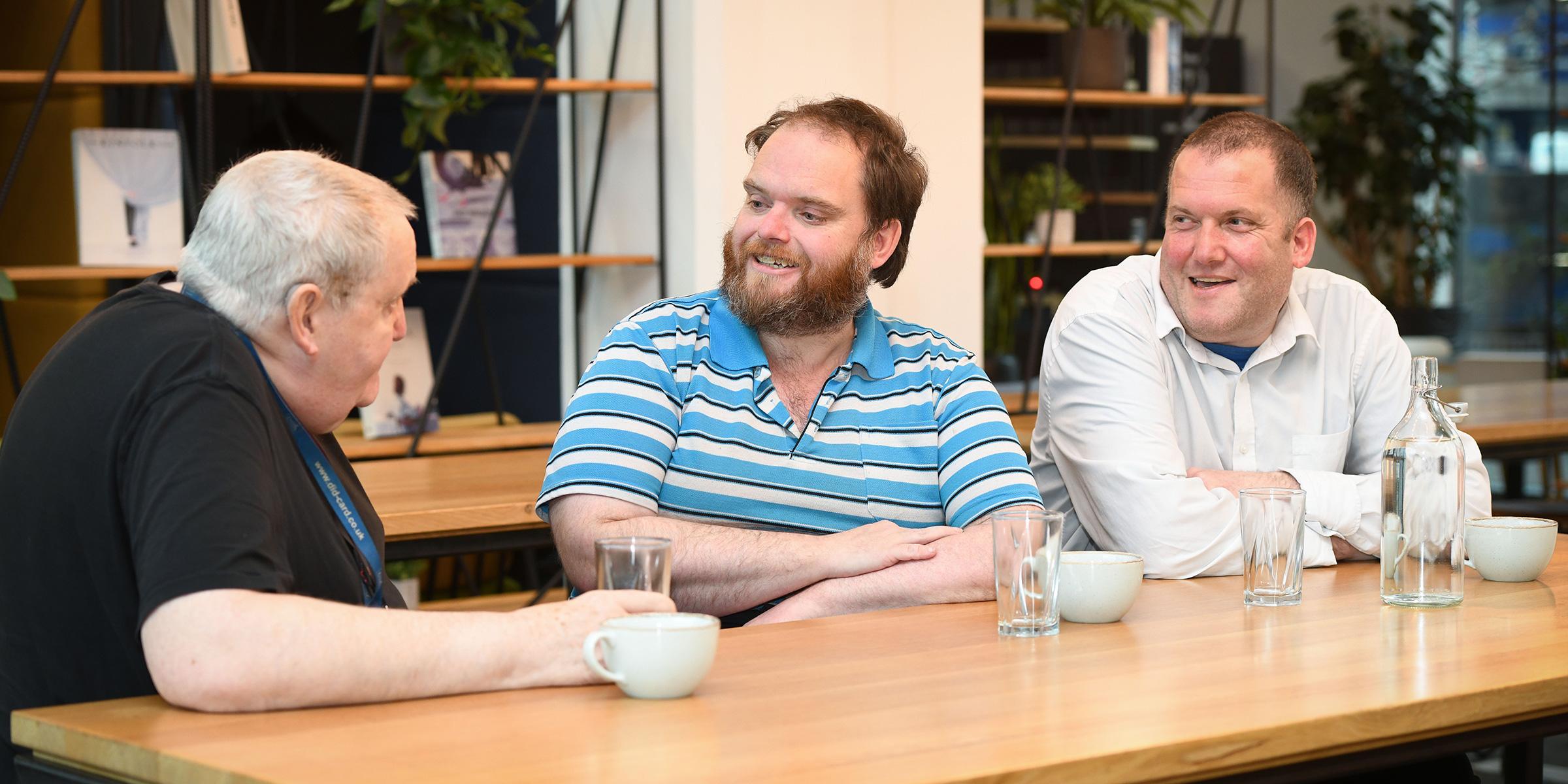
Supporting Dad after his dementia diagnosis as a person with a learning disability
Adam Joesbury, in Birmingham, cares for his father Bob. Adam has a learning disability and is using his voice to call for more support for carers like him.
‘It’s weird,’ Adam says. ‘I’m a carer for my dad but he used to be my carer.’
When asked what makes a good carer, Adam taps his chest – his way of saying that to be a good carer, you must be kind.
Adam’s dad Bob was born in 1960s Birmingham.
He worked in the Jewellery Quarter as a drop stamper – a skilled but dangerous job using a heavy hammer to press metal into shape.
A work accident forced Bob to leave, then he worked as a porter and in security.
Bob married and they had two sons, Neil and Adam.
After his relationship broke down, Bob and the two boys moved to live with his parents. They helped Bob to bring his sons up.
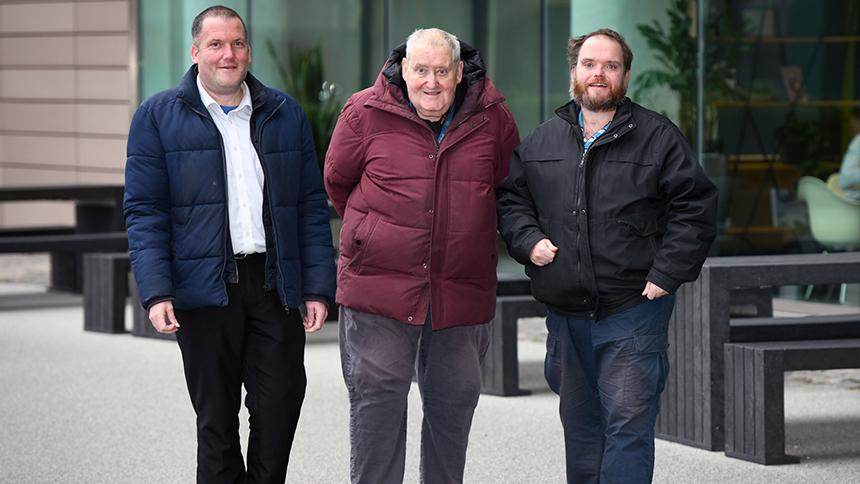
Life changes and challenges
Adam was born with health problems and, as he grew up, Bob noticed he could only concentrate for short periods.
Adam was diagnosed with a learning disability at the age of five.
Although Adam struggled to settle at schools for children with a learning disability and needed extra support, he went to college and volunteered as a landscape gardener.
He went on to learn woodwork, making wooden planters and house numbers – their own house number now helps Bob find his way home.
Bob first noticed small changes in his memory after having a brain bleed in 2017.
He was referred to a memory clinic and discovered that he’d also had two mini-strokes. Bob was later diagnosed with vascular dementia.
‘From that day in 2017, everything changed,’ says Neil.
I became not just a co-carer but a carer for two.
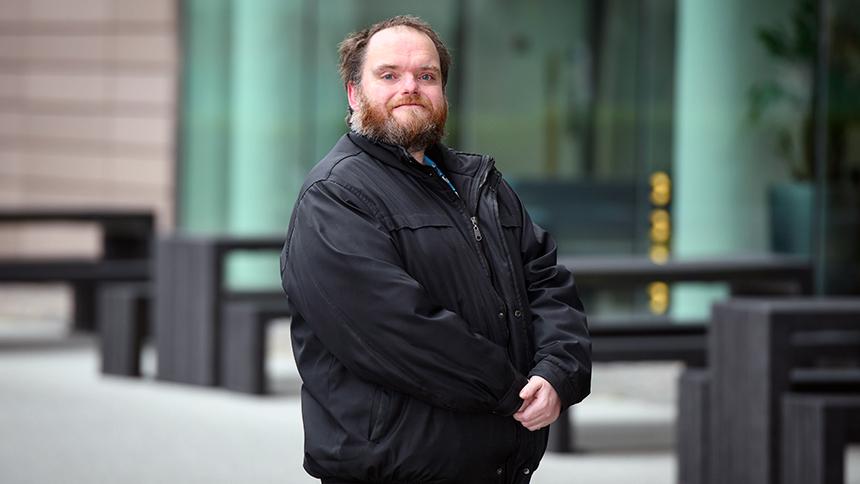
Caring together as a team
As Bob’s dementia has progressed, both Adam and Neil have been there for him.
‘Working as a team is better than working on your own,’ Neil says. ‘We all bounce off one another.’
Adam knows he can call Neil if he’s having a bad day.
Bob also wears a GPS tracker, which gives Neil peace of mind when he’s at work.
Adam helps his dad with the shopping, and they take turns to pay.
‘I couldn’t do it on my own,’ Bob says.
They remind me when I’m out shopping and get confused. I don’t go anywhere without my tracker!
Bob likes to walk to the local shops but can get lost if he goes past the area he’s familiar with.
Bob would also attend his local memory café on his own if he could, but Neil and Adam take him so they know he gets there safely.
Neil says the café gives him and Adam a break.
The café gives me and Adam time together to have a chat and do our own things.
All three take turns to cook.
‘I can cook but I need help knowing when it’s done,’ Adam says. ‘Neil worries that I’m going to chop my fingers off.’
Neil says, ‘It’s because you used to use a big chopper knife!’
Lack of support
Although the family are there for each other, it hasn’t always been easy.
After Bob’s diagnosis, Adam struggled to understand what dementia was.
He should have been allocated an advocate – an independent person who’d make sure he got the support he needed from his local council.
An advocate can stand up for the carer’s rights when they’re less able to do so themselves.
They can support the person if their needs aren’t being met or if they don’t understand something. However, no one knew about this.
Adam didn’t enjoy going to carers’ support groups, as they weren’t accessible to him.
‘I gave it a go, but it didn’t work,’ he says.
The first time I meet people I get nervous, and when people talk too quickly I don’t understand them. If there were more groups for carers with a learning disability, it would be good.
Neil says, ‘We were hitting brick walls each time we tried to find support for Adam. I took him to a carers’ support group, but he didn’t know what was going on and he was getting really bored.
'But one day, Alzheimer’s Society turned up to the group and Kathy was there.'
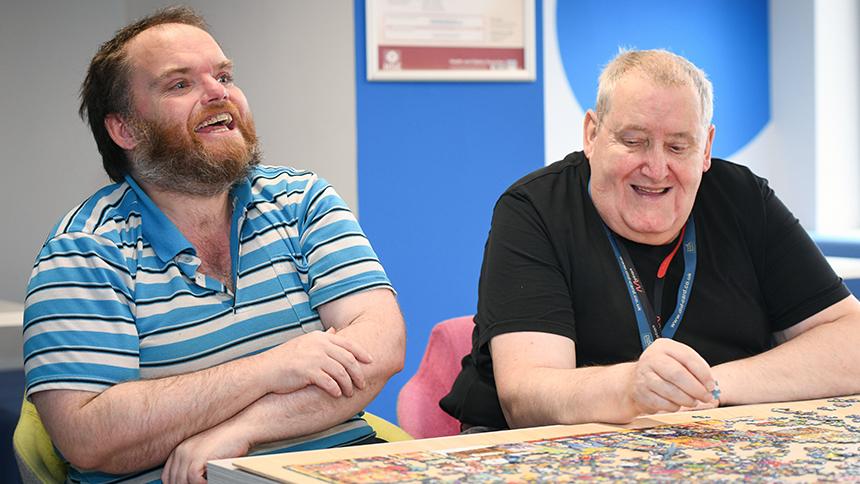
Our dementia adviser helped Adam to understand
Kathy is a dementia adviser who supports people affected by dementia in Birmingham and Solihull.
‘Without Alzheimer’s Society’s support, we’d be struggling now,’ Neil says.
This turned things around for Adam.
Kathy has helped Adam to understand dementia by presenting information in a visual way.
First my learning disability wouldn’t let me understand dementia. But doing it with pictures makes it easier. And I like drawing to understand when people are talking to me.
Neil says this support has enabled him to continue working while Adam cares for Bob.
‘I can now help Dad and Adam keep their independence,’ he says.
Active lives and maintaining independence
The trio loves going on outings together, whether it’s playing pool at the local pub or visiting Blackpool Tower, where Bob used to ballroom dance.
They also use public transport as much as possible. ‘If I know the place, I can help Dad get round,’ says Adam.
Adam says his sense of humour helps him with caring.
When I put a bit of fun into it, that’s the way I understand it. I don’t do boring.
‘It’s not easy when you’re having a bad day. When you’re having a good day it’s easier. I try and sort it out myself but if I can’t, I ring Neil.’
Neil says, ‘Adam sometimes doesn’t realise when he needs help, but you can tell by his facial expression and if he’s scratching his head.
'With the bond we have, we find a way – whether it’s a good day or bad.'
Supportive community
Adam, Neil and Bob are all well-known in their area.
Local businesses know about Bob’s dementia, stepping in if he needs help when out and about.
Bob remembers going out one day to the cashpoint he usually uses but finding it broken. He went to a different one and got lost.
Luckily for him, staff at a local shop knew where he lived and pointed him in the right direction.
‘We can’t go anywhere,’ Adam says, ‘because someone will recognise Neil and he stands there for half an hour talking!’
Adam and Neil would like people to be more patient and helpful, as they say this makes a huge difference to them.
People might walk past and ignore you. Some people aren’t so understanding because Dad and Adam have hidden disabilities, but it doesn’t take two minutes to talk to someone.
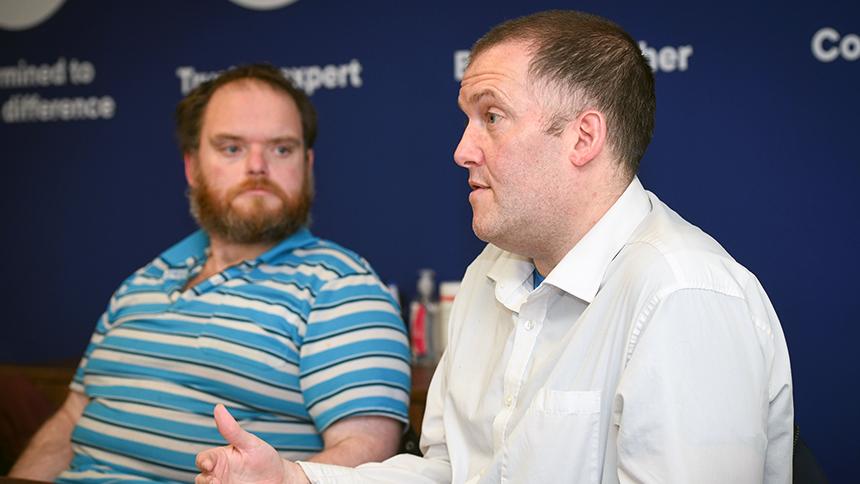
Changing things for carers with a learning disability
Adam is passionate about making life better for carers with a learning disability.
He doesn’t want them to go through the same struggles he did.
People do seem to be listening, and the first ever support group for carers with a learning disability has started in Birmingham, run by local advocacy service CASBA.
It has taken Adam huge courage to speak out, including at an Alzheimer’s Society conference.
There were 200 people at conference, and I was shaking. We had a bit of fun with the audience – I got a laugh out of all of them.
Adam wants to write to the Prime Minister to tell him what needs to change for carers with a learning disability.
‘I’d tell the Prime Minister that people with a learning disability can be carers,’ he says.
People think you can’t be a carer with a learning disability, but you can. I ignore those people. What’s the point in arguing? You won’t go anywhere.
‘I’m proud of my boys’
Bob says he’s very proud.
‘My two sons really do look after me,’ he says. ‘They know when I’m struggling, and they’ll help me out.
I really do rely on them and I’m grateful for them. I thank Adam for the way he has taken all this on and shown he can do it.
‘Adam is a great support,’ Neil says. ‘He’s been himself all the way through.’
‘I do try,’ Adam says.
Donate
£15 can fund a dementia adviser like Kathy to support people like Adam through a dementia diagnosis and beyond.


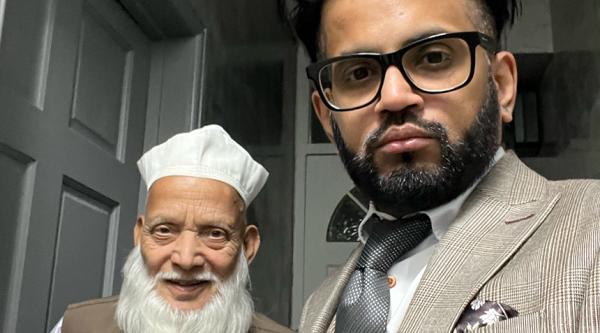
Clive downing
saysGillian Oreilly
saysMarjorie
says